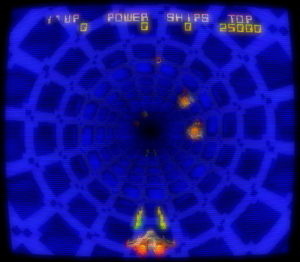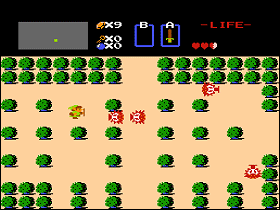 The Game: Link wanders the kingdom of Hyrule, attempting to defeat the minions of the evil Ganon and trying to gather the weapons, tools, and items he will need to free the kingdom. Most vital on his quest is the recovery of all the pieces of the magical Triforce, the most powerful force that can be brought against Ganon. But as each piece is recovered and each part of the quest is completed, the next leg of the journey is even more difficult. (Nintendo, 1987)
The Game: Link wanders the kingdom of Hyrule, attempting to defeat the minions of the evil Ganon and trying to gather the weapons, tools, and items he will need to free the kingdom. Most vital on his quest is the recovery of all the pieces of the magical Triforce, the most powerful force that can be brought against Ganon. But as each piece is recovered and each part of the quest is completed, the next leg of the journey is even more difficult. (Nintendo, 1987)
Memories: If Super Mario Bros. and the Donkey Kong series hadn’t already marked the arrival of Shigeru Miyamoto as a master video game designer, the deal was sealed with the arrival of The Legend Of Zelda, which was a game-changing entry in the adventure genre, to say the very least. Zelda was the title that finally blew down the door and gained wide acceptance for adventure games that couldn’t be finished in a single sitting. Prior to this, adventure games had a niche audience, but tweaking the conventions and expectations of the genre and putting it on a console instead of a computer made Zelda a winner.
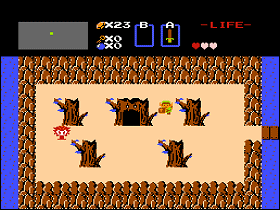 Before Zelda, the vast majority of deep adventure games were on computers, and tended to be turn-based: basically, a computer-moderated take on pencil-and-dice RPGs a la Dungeons & Dragons. Turn-based computer RPGs such as the Ultima series and Tunnels Of Doom followed the conventions of non-computerized RPGs; the Ultima games introduced a time limit, giving players a pre-defined window of time for entering commands before the computer-controller enemy’s next turn would be initiated. There were attempts to bring the conventions of RPGs into a real-time setting with such titles as the Apshai games, but Zelda made waves by cramming a computer-sized adventure into a cartridge for the NES.
Before Zelda, the vast majority of deep adventure games were on computers, and tended to be turn-based: basically, a computer-moderated take on pencil-and-dice RPGs a la Dungeons & Dragons. Turn-based computer RPGs such as the Ultima series and Tunnels Of Doom followed the conventions of non-computerized RPGs; the Ultima games introduced a time limit, giving players a pre-defined window of time for entering commands before the computer-controller enemy’s next turn would be initiated. There were attempts to bring the conventions of RPGs into a real-time setting with such titles as the Apshai games, but Zelda made waves by cramming a computer-sized adventure into a cartridge for the NES.
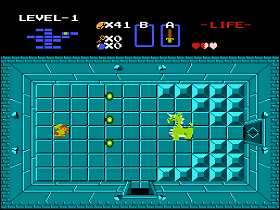 Nintendo knew it had a potential hit on its hands, but as role-playing games in general had a somewhat checkered image in the U.S. (i.e. the great Dungeons & Dragons “Satanist” scares of the ’70s and early ’80s), Zelda was rolled out as an action game in special packaging that completely broke with the “house style” established by previous NES releases. A national television advertising campaign in the U.S. made it impossible not to know that Zelda was coming, though the ad campaign downplayed the game’s dramatic/adventure-oriented elements by playnig it safely goofy (a Zelda-themed rap performed by the two whitest kids Nintendo’s ad agency could possibly have found). Zelda originally appeared in 1986 on the Famicom Disk System in Japan; the year-and-a-half gap between that initial release and its appearance in the English speaking world is evidence that Nintendo was treating this game with great care.
Nintendo knew it had a potential hit on its hands, but as role-playing games in general had a somewhat checkered image in the U.S. (i.e. the great Dungeons & Dragons “Satanist” scares of the ’70s and early ’80s), Zelda was rolled out as an action game in special packaging that completely broke with the “house style” established by previous NES releases. A national television advertising campaign in the U.S. made it impossible not to know that Zelda was coming, though the ad campaign downplayed the game’s dramatic/adventure-oriented elements by playnig it safely goofy (a Zelda-themed rap performed by the two whitest kids Nintendo’s ad agency could possibly have found). Zelda originally appeared in 1986 on the Famicom Disk System in Japan; the year-and-a-half gap between that initial release and its appearance in the English speaking world is evidence that Nintendo was treating this game with great care.
Nintendo also borrowed from the playbook of adventure game publishers who had made a splash in the early ’80s: a telephone “help line” charged by the minute for hints to help players extricate Link from seemingly impossible situations, and – shades of Infocom – hint books were commercially available, helping to kick-start the strategy guide craze. The Legend Of Zelda was a deep enough game that players needed these helpful hints, even if they had to pay for them. The remora-and-shark economy of video game strategy guides had begun in earnest.
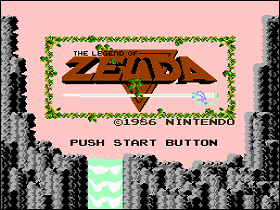 And if he wasn’t already, Zelda producer Shigeru Miyamoto, who had already brought great success to Nintendo in the form of Donkey Kong and Super Mario Bros. was now officially a game design superstar. Composer Koji Kondo, also a Super Mario alumnus, created one of the all-time great video game theme tunes for Zelda, one that has proven infinitely adaptable and scalable (full-orchestrated symphonic recordings are not uncommon; neither are big band and ska interpretations). And, of course, offshoots of Link’s story have provided endless spin-off games, to say nothing of an animated series, toys, and other merchandise. The Legend Of Zelda is one of Nintendo‘s three major tentpoles (along with Super Mario and Pokemon).
And if he wasn’t already, Zelda producer Shigeru Miyamoto, who had already brought great success to Nintendo in the form of Donkey Kong and Super Mario Bros. was now officially a game design superstar. Composer Koji Kondo, also a Super Mario alumnus, created one of the all-time great video game theme tunes for Zelda, one that has proven infinitely adaptable and scalable (full-orchestrated symphonic recordings are not uncommon; neither are big band and ska interpretations). And, of course, offshoots of Link’s story have provided endless spin-off games, to say nothing of an animated series, toys, and other merchandise. The Legend Of Zelda is one of Nintendo‘s three major tentpoles (along with Super Mario and Pokemon).
 By moving computerized RPGs away from the stat-sheet-obsessed nature of their paper-and-dice forebears, and pushing the action from turn-based into real-time, The Legend Of Zelda rewrote the DNA of an entire genre…and rewrote the already-burgeoning success story of the company that spawned it. That it’s an addictively good game into the bargain is what makes it one of the all-time greats.
By moving computerized RPGs away from the stat-sheet-obsessed nature of their paper-and-dice forebears, and pushing the action from turn-based into real-time, The Legend Of Zelda rewrote the DNA of an entire genre…and rewrote the already-burgeoning success story of the company that spawned it. That it’s an addictively good game into the bargain is what makes it one of the all-time greats.

